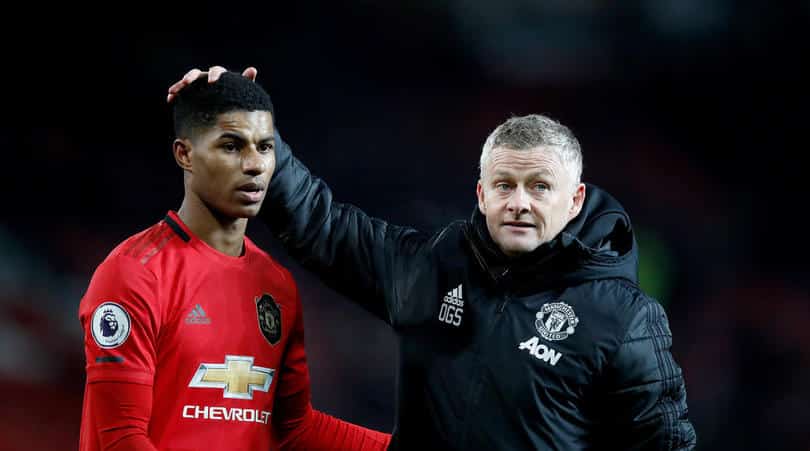Ole Gunnar Solskjaer is hoping Marcus Rashford can continue to manage a shoulder issue as Manchester United kick off a big week at West Ham.
The 23-year-old missed the first chunk of the year with a back injury and has been impressive with his performances since football resumed amid the coronavirus pandemic.
But Rashford is now dealing with a shoulder problem, which had him pull out of England’s November internationals and come off in the second half of Wednesday’s 3-1 Champions League defeat by Paris St Germain.

Solskjaer has not given up on him featuring against West Ham on Saturday, which is followed by a make-or-break Champions League clash at RB Leipzig on Tuesday and Manchester City arriving at Old Trafford next weekend.
‘Marcus has been training this morning, not fully but he’s joined in with the group,’ the United boss said.
‘Obviously his shoulder stopped him finishing the game, so he’s been getting treatment and hopefully he’ll be part of the squad that travels.
‘He’s having treatment now after training.’
Rashford’s availability would be a welcome boost against West Ham but the ongoing issue raises questions about how to best handle the forward.
‘Of course, that’s a medical issue, how serious is it,’ Solskjaer said.
‘At the moment he’s getting that tiredness towards the end or that soreness towards the end that stops him from completing the games. Hopefully it won’t take too long to completely go away.
‘But, of course, you think about how you manage these players throughout the whole season anyway.
‘Marcus, as you say, he’ll run through a brick wall for you and that’s the type of lad he is.
‘We’ve just got to be fingers crossed that it doesn’t get worse because at the moment it is still manageable.’
Luke Shaw is the only United player ruled out of Saturday’s trip to the London Stadium, which has been an unhappy hunting ground for the Red Devils in recent years.
West Ham could beat United for a third successive home league match for the first time since managing it four seasons on the trot in the mid-1970s, with their chances boosted by the return of 2,000 supporters.
‘It’ll be great playing in front of fans, we’re looking forward to it,’ Solskjaer said ahead of the Red Devils’ first game in front of a crowd since March.
‘Of course we won’t have our fans there but we’ll just have to use the energy or thrive off the home fans and make them quiet hopefully, that we can make them edgy.
‘We’re looking forward to it. It’s great to see fans back in a stadium. Of course, we want it back in Old Trafford as well and hopefully we’ll get that soon.
‘Football is not the same, it’s not been the same, so great [to see some back].

‘Of course, we’re a bit bruised and disappointed after Wednesday night but hopefully we’ll be ready to go again tomorrow.’
United cannot currently host supporters at a reduced capacity as the area is currently in tier three of the UK government’s Covid-19 winter restrictions.
But the Old Trafford giants have provisional plans in place for fans to return once given the go-ahead to do so, with the club ready to host supporters against Leeds on 20 December as the tiers are reviewed that week.
For matches with 2,000 spectators, tickets will be priced at £30 for adults, £15 for under-20s and over-65s, and £10 for children, with supporters to be located in sections of the Sir Alex Ferguson Stand and the Stretford End.
United chief operating officer Collette Roche said: ‘It is important to present these conditional plans for the return of our fans to allow preparations to be made.
‘We are eager to welcome them back and thank them in advance for their patience and co-operation with our new operating policies that are in place to keep everyone safe.
‘Responsible behaviour will help build trust and confidence, helping us move back to greater capacity numbers in the future once Manchester’s restrictions are reduced.
‘We know we are asking a lot from our fans in terms of the adjustments to their usual match-day routines. In return, we are committed to making the experience as safe as possible for them and their families and have also kept ticket prices low.’





